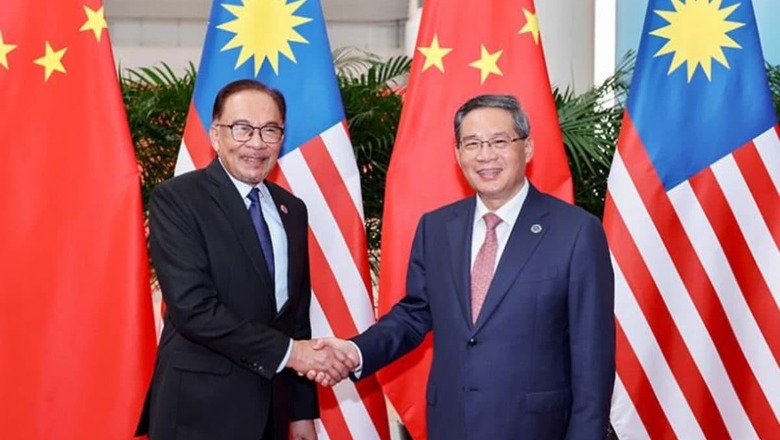
views
In light of Prime Minister Datuk Seri Anwar Ibrahim’s recent visit to Nanning, China, where he attended the 20th China-ASEAN Expo (CAExpo) 2023 and the China-ASEAN Business and Investment Summit (CABIS), it is evident that Malaysia is committed to deepening economic cooperation with China. Read together with China’s recent issuance of maps, Malaysia (and other ASEAN states) calling out China, and later PM Anwar’s statement calling China’s explanation of disputed maps reassuring, indicates that Malaysia gives preference to economic ties over territorial disputes with China. This is in stark contrast with approaches other ASEAN claimant states, especially the Philippines, have about the South China Sea dispute.
During his visit, PM Anwar was accompanied by Investment, Trade, and Industry Minister Tengku Datuk Seri Zafrul Tengku Abdul Aziz, underscoring the importance of the trip. China reciprocated by sending Chinese Premier Li Qiang, who met with the Malaysian Prime Minister. This gesture was noteworthy, especially since Guangxi Region party secretary Liu Ning was originally expected to host.
Deepening Economic Cooperation: Both Malaysia and China have expressed their commitment to enhancing their ongoing economic collaboration, including Belt and Road Initiative projects, the Regional Comprehensive Economic Partnership (RCEP), and China-Malaysia cooperation projects like the “Two Countries, Twin Parks” and the East Coast Rail Link (ECRL). Media reports also mention China’s support for Malaysia’s latest development strategies i.e., the New Industrial Master Plan 2030 (NIMP 2030), Malaysia MADANI and the Asian Monetary Fund (AMF). The Prime Minister had stated that “Chinese leaders have high regard for and support Malaysia Madani and the AMF”.
China has also pledged to double its palm oil imports from Malaysia, offsetting losses resulting from restrictions imposed by the European Union. In return, Malaysia supports China’s accession to the Comprehensive and Progressive Agreement for Trans-Pacific Partnership (CPTPP). PM Anwar also urged China to re-energise its Belt and Road Initiative, which slowed down during and after the Covid-19 pandemic. Malaysia’s economic dependence on China is self-evident; what’s more important is that the Anwar government is putting huge bets on China for the success of its own economic goals. This could work either way.
Diversifying Collaboration: Beyond existing projects, both sides have indicated a willingness to expand cooperation into new areas, such as developing new energy vehicles, bolstering the digital economy, and strengthening exchanges in education, scientific research, and cultural tourism. As Malaysia and China approach the 50th anniversary of their bilateral ties, these developments reflect the positive nature of their relationship.
The South China Sea Dispute: Despite the overall positive trajectory of their relations, it’s crucial to acknowledge the complex South China Sea (SCS) dispute. Just two weeks ago, Malaysia and other ASEAN partners issued statements in response to China’s new map that captures its “nine-dash line” territorial claims over the South China Sea; a claim that covers the exclusive economic zone (EEZ) maritime areas of Malaysia, Brunei, the Philippines, Indonesia, and Vietnam.
In its statement, Malaysia stated it does not recognise China’s claims in the South China Sea and that the new map would not have any binding effect on it. Notwithstanding, it also stated that this “complex and sensitive” must be resolved through dialogue and consultation by international law, including UNCLOS.
It was inevitable that the matter would be raised and discussed during the Malaysian Prime Minister’s recent visit, but again both sides were unwilling to sacrifice their good relations for the South China Sea (SCS). Both sides instead stated their commitment towards working closely with each other to maintain peace and stability in the region.
How this would be achieved is the question. For China, its interest in the SCS is driven by economic, security, geopolitics, and history. From the Malaysian viewpoint, in addition to economic and security considerations, failure to defend its claim, especially those portions that impact the Bornean states of Sabah and Sarawak, could have domestic political repercussions.
These regions are considered among the least developed. Many of its communities still depend on those areas for their livelihoods and important foreign earnings (e.g., tourism, fisheries). How will China’s claims impact Sarawak’s claims on oil fields that are within 200 nautical miles, and which could be a boon for its future development plans?
The SCS holds significant economic and geo-strategic importance, containing vast reserves of oil and natural gas and contributing to the food security of millions in Southeast Asia. It is no wonder that since the early 1970s, many parts of it have been claimed by multiple parties — Brunei, Indonesia, Malaysia, Philippines, Taiwan, and Vietnam. These competing claims have been compounded by China’s claim in the area, which is increasingly utilising hard tactics to effect its claims. Malaysia’s concerns in this matter are twofold: economic and domestic political repercussions. The Bornean states of Sabah and Sarawak, which rely on these areas for livelihoods and foreign earnings, may be affected by China’s claims, particularly about oil fields within 200 nautical miles.
Malaysia’s Balancing Act: Malaysia has adopted a cautious approach, seeking to balance its interests in the SCS while maintaining good relations with other claimants, including China. So far, this cautious approach has not yielded substantive positive results as while claiming more and more islands, islets, rocks, and Exclusive Economic Zones through its cartographic invasions, island reclamation and militarisation activities, China has not discriminated between a ‘friendly’ Malaysia and an increasingly assertive Philippines or Indonesia. Responses from other claimant ASEAN countries are also noteworthy in this regard: prompting some to respond in kind. The Philippines, which once courted China, now has granted US access to five military bases. Vietnam has upgraded its diplomatic status of the US to that of a “strategic comprehensive partner”, and Indonesia, despite not being a claimant in the South China Sea dispute, has been firm in defending its rightful EEZ in the South China Sea. ASEAN’s first-ever joint military exercise in the South China Sea in September, under Indonesia’s Chairmanship should be read in that context. Malaysia’s approach is getting increasingly distinct from the rest, excluding, of course, Brunei which has remained silent on the issue for years.
Future Uncertainties: Ultimately, Malaysia’s trepidatious balancing act and the trajectory of Sino-Malaysian relations depend on multiple factors, many of which are beyond Malaysia’s control. Tensions in the region, the choices of ASEAN partners, and China’s actions will all play pivotal roles. As responses from China and those from the US and its allies become harder, Malaysia will be forced to make a choice, or the choice will be made for it by either of the sides. Malaysia must remain prepared for any outcome, recognising that ambiguity has its limits and that clear decisions may become necessary as circumstances evolve.
Rahul Mishra is Director, Centre for ASEAN Regionalism Universiti Malaya (CARUM), Asia-Europe Institute, Universiti Malaya. He tweets @rahulmishr_Peter Brian M Wang has held various positions in the Malaysian government, primarily at the Ministry of International Trade and Industry (MITI). He is currently attached with the National Institute of Public Administration (INTAN), where he lectures and undertakes research on economic and international-relations policy. He is working on his PhD at the Asia-Europe Institute, University of Malaya. He tweets @PBMWang. Views expressed in the above piece are personal and solely that of the author. They do not necessarily reflect News18’s views.

















Comments
0 comment